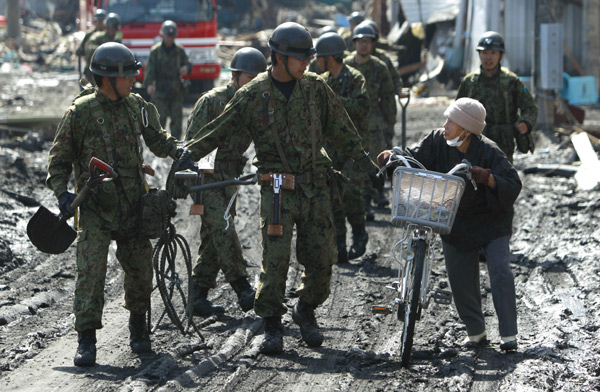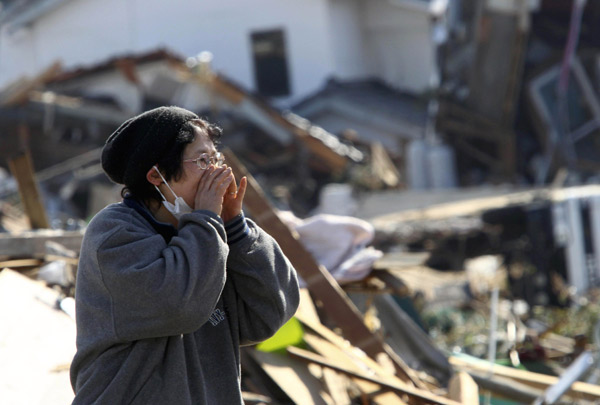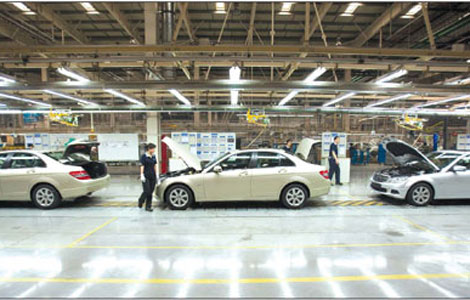Asia
Japan begins to dig for dead amid devastation
Updated: 2011-03-15 08:21
By Jay Alabaster and Todd Pitman (China Daily)
|
 Japan Ground Self-Defense Force soldiers urge an elderly woman to move to higher ground during a tsunami warning on Monday in Soma, Fukushima prefecture. Wally Santana / Associated Press |
TAKAJO, Japan - Rescue workers used chain saws and hand picks on Monday to dig out bodies in Japan's devastated coastal towns, as the nation faced a mounting crisis in the aftermath of a massive earthquake and tsunami.
More than 10,000 people are estimated to have died in Friday's double-headed tragedy, which caused unimaginable deprivation for people of this industrialized country that has not seen such hardships since World War II.
In many areas there is no running water, no power and four- to five-hour waits for gasoline. People are suppressing hunger with instant noodles or rice balls while dealing with the loss of loved ones and homes.
"People are surviving on little food and water. Things are simply not coming," said Hajime Sato, a government official in Iwate Prefecture, one of the three hardest hit.
"We have repeatedly asked the government to help us, but the government is overwhelmed by the scale of damage and enormous demand for food and water," he said.
"We are only getting around just 10 percent of what we have requested. But we are patient because everyone in the quake-hit areas is suffering."
He said local authorities were also running out of body bags and coffins.
"We have requested funeral homes across the nation to send us many body bags and coffins. But we simply don't have enough. We just did not expect such a thing to happen. It's just overwhelming."
Sato said local authorities may ask foreign funeral homes to send supplies.
Search parties arrived in Soma, Fukushima prefecture, for the first time since Friday to dig out bodies. Ambulances stood by and body bags were laid out in an area cleared of debris, as firefighters used hand picks and chain saws to clear an indescribable jumble of broken timber, plastic sheets, roofs, sludge, twisted cars, tangled power lines and household goods.
|
 A woman calls out the names of her family in Soma, Fukushima prefecture, on Monday. Yomiuri Shimbun / Agence France-Presse |
Helicopters buzzed overhead, surveying the destruction that spanned the horizon. Ships were flipped over near roads, 1 km inland. Officials said one-third of the city of 38,000 people was flooded and thousands were missing.
"I'm giving up hope," said Hajime Watanabe, 38, a construction industry worker, who was the first in line at a closed gas station in Sendai, about 100 km north of Soma. Just then, an emergency worker came over and told him that if the station opens at all, it would pump gasoline only to emergency teams and essential government workers.
"I never imagined we would be in such a situation" Watanabe said. "I had a good life before. Now we have nothing. No gas, no electricity, no water."
He said he was surviving with his family on 60 half-liter bottles of water his wife had stored in case of emergencies like this. He walked two hours to find a convenience store that was open and waited in line to buy dried ramen noodles.
The government has sent 100,000 troops to spearhead the aid effort. It has sent 120,000 blankets, 120,000 bottles of water and 110,000 liters of gasoline plus food to the affected areas. However electricity would take days to restore.
At least 1.4 million households had gone without water since the quake struck and some 1.9 million households were without electricity.
In the town of Minamisanrikucho, 10,000 people - nearly two-thirds of the population - have not been heard from since the tsunami wiped it out, a government spokesman said.
About a third of the town of Soma was wiped out, with several hundred homes washed away. Three districts of town on the shoreline are now covered in rubble, overturned cars and trucks and waist-high, dirty green water. A tiny pink girl's bicycle, all twisted up, sits near a child's backpack - just some of the personal belongings littering the landscape.
Atsushi Shishito sat in a daze on the concrete foundation of his home, now completely washed away. He sleeps at an evacuation center. The 30-year-old carried his grandmother to higher ground to escape the tsunami.
"All my other relatives are all dead," he added. "Washed away."
Associated Press
E-paper

Factory fever
Despite auto manufacturing bubble scare, car giants gear up expansion of factories.
Dressed for success
Fabric of change
High spirits
Specials

Earthquake Hits Japan
A massive 8.8 magnitude quake hit the northeast coast of Japan on March 11,2011.

NPC & CPPCC sessions
Lawmakers and political advisers gather in Beijing to discuss major issues.

Panda campaign
Black-and-white bear helps Chengdu in marketing campaign after quake.




